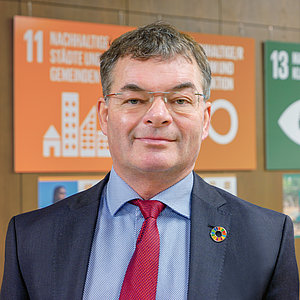Engaging in dialogue
From climate change to biodiversity loss, and from the COVID-19 pandemic to worsening inequality – the challenges facing international cooperation in general, and GIZ in particular, are huge. To address them we need all the available capacity and skills, and strong alliances. That is why we constantly seek dialogue with our stakeholders. Only this allows us to enhance our services further and to continue learning.
This motivated us in 2016 to organise an intensive and systematic dialogue with our stakeholders. Every two years we invite representatives from the worlds of politics, business, the scientific and academic community, and civil society to express their expectations and criticism of our work. The third Stakeholder Dialogue took place in 2020 and was held online as a result of the pandemic. It delivered important findings for the direction our sustainability management should be taking. Based on these findings, GIZ sets itself clear objectives in the fields of environmental protection, climate change mitigation, human rights, sustainable procurement, efficient use of resources and many other areas, and uses measures and indicators to link these to its Sustainability Programme 2021–2025.
The Stakeholder Dialogue gave us the opportunity to discuss with our partners and commissioning parties what they expect of us in the coming years, and where they see our greatest potential in terms of sustainability issues. Discussions revolved around the key sustainability topics, which we systematically identify in advance of the dialogue.
GIZ’s objective of becoming climate neutral is commendable. It could play a leading role, for example by introducing carbon budgets.

(© NABU / Hoffotografen)
The volume of public sector procurement – EUR 500 billion – illustrates how much leverage it offers. Public sector procurement therefore plays a very significant role in sustainable development and Germany’s Sustainable Development Strategy.

(© BMZ)
Material topics
We identified 16 material topics for the future orientation of our sustainability management, and discussed these with our stakeholders. They are mapped in a ‘materiality matrix’, which presents the expectations of stakeholders in relation to GIZ’s potential to make a difference. On this basis, a ranking list was drawn up, headed by climate change mitigation and conservation of natural resources, sustainable procurement and protecting human rights. This provides us with valuable information to help us focus our sustainability agenda. We will, for instance, pursue our efforts to avoid, reduce and offset our greenhouse gas emissions, and will apply the most rigorous sustainability criteria when we procure materials, equipment and services, in project work as elsewhere. The material topics are also the basis for GIZ’s sustainability reporting in accordance with the standards laid down by the Global Reporting Initiative (GRI).
Diagram with an x-axis and a y-axis: The x-axis is labelled "GIZ's potential Impact" and has three ranges: medium, high and very high. The y-axis is labelled "Stakeholder expectations" and also has three ranges. The numbers 1 to 16 are positioned in this diagram.
This results in three squares with numbers: Area A (GIZ's impact potential = very high, expectations of stakeholders = very high): Numbers 1 to 6. Area B (impact potential of GIZ = high, expectations of stakeholders = high): numbers 7 to 15. Area C (impact potential of GIZ = medium, expectations of stakeholders = medium): the number 16.
Ranking
1. Climate protection
2. Protection of natural resources
3. Sustainable procurement
4. Protection and promotion of human rights
5. Sustainable mobility
6. Biodiversity
7. Diversity and gender
8. Compliance and anti-corruption
9. Digitalisation
10. Work-life balance and employee health
11. Sustainable events
12. Cooperation and partnership management
13. Staff development
14. Responsible use of funds
15. Learning organisation
16. Social engagement
Information on the following Sustainable Development Goals (SDGs) can be found on this page:
